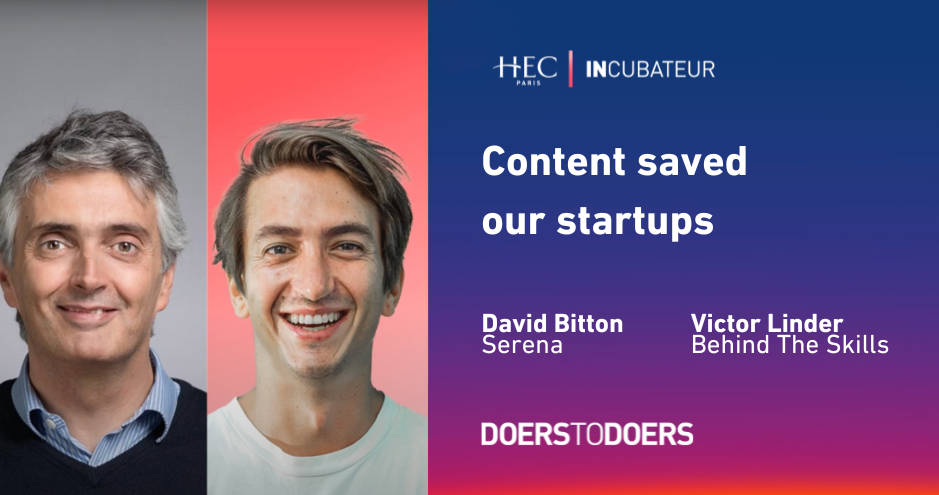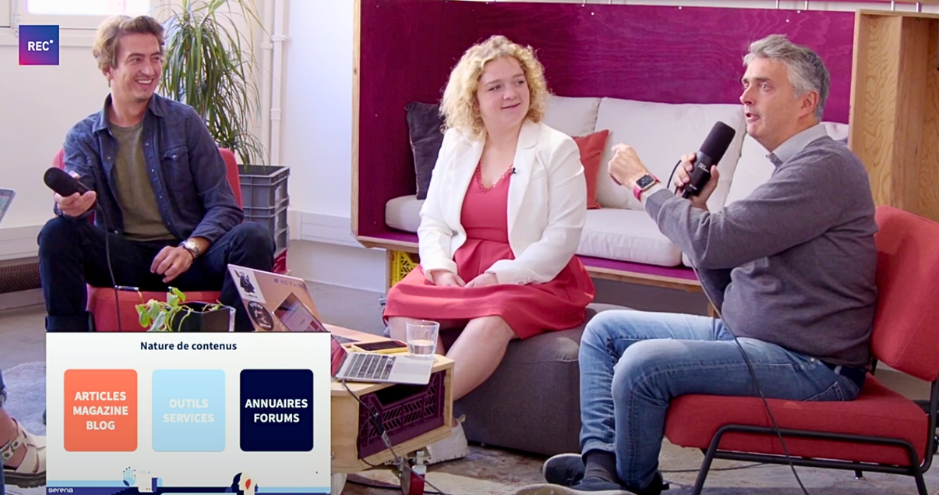"Content saved our startups."
Under this intentionally provocative title lies a new session of "Doers to Doers." A flagship event of the Incubateur HEC Paris, Doers to Doers offers pragmatic feedback and concrete advice to entrepreneurs.
During this session, titled "Content Saved Our Startups," two serial entrepreneurs and content stars have agreed to share their expertise: Victor Linder, co-founder of the video media Behind the Skills, and David Bitton, Operating Partner at the investment fund Serena.
At what point did content become decisive for them? What strategies allowed them to save their companies? What successes has content enabled them to achieve? For David, it was a lifesaver when the coffers of his latest startup were empty but traffic generation was essential... So yes, content can be intimidating, but rest assured, David and Victor are here to guide you in boosting your visibility and sales on the web.

Before sharing their valuable advice, the two experts remind us that there are different layers of content, and the key is to start 'small.' Forget about Harvard Business Review articles or meticulously crafted Netflix-style documentary videos, focus instead on a LinkedIn post or a smartphone video while walking down the street.
1. No Value, No Business
“Let’s stop being self-centered on the Internet!” exclaims Victor, who believes that companies and content creators should focus more on providing value rather than talking about themselves or their products. He suggests concentrating on use cases to understand the problems that your product can solve. And 'spoiler alert': “The top video that shows up in search results,” Victor explains, “is very often a video of someone who filmed themselves with their webcam, at home.” Why is it in the top position? Because it perfectly addresses a well-identified problem... despite its 'amateur' quality.
Nevertheless, a viral video or a high-value article is far from enough to survive and stand out…
2. Consistency to Survive
Search Engine Optimization (SEO), which aims to position you on search engine results pages, is far from obsolete. "Google or YouTube, it’s the same battle," asserts Victor, who reminds us that "YouTube is on track to become the number one search engine." Our two experts explain that to improve your visibility and generate leads, everything relies on a content strategy that prioritizes SEO, which requires regularity. "Perseverance is key," emphasizes Victor, "to be recognized by algorithms and appear in search results." This way, you will stay 'top of mind' with potential clients and can accompany them throughout their decision-making process until they are ready to work with you.
However, it’s not necessary to create an overwhelming amount of content. Victor advises starting with one piece per month and gradually increasing the frequency until you are capable of producing much more because what matters most is consistency.
OK, but how can you produce one or even several pieces of content per week?
3. The Art of Recycling to Fuel Your Content Strategy
Text and video are not at odds; on the contrary, they complement each other! For Victor and David, combining the two proves to be a winning strategy for increasing organic traffic and maximizing engagement and reach. This is where so-called 'waterfall content' becomes highly valuable. “You can absolutely write content and then transform it into video animations,” explains Victor. He suggests approaching content creation with a holistic vision, considering all possible variations from the outset: starting with a white paper that can be transformed into webinars, blog articles, posts, animations, etc. These different formats feed your newsletters, enhance your social media presence, and increase your visibility on Google and YouTube.
4. All Content Matters!
Another often overlooked piece of advice is the value of service-oriented content, specifically tools and services, which should not be neglected for boosting your SEO. “The company Preto excels in terms of dwell time (time spent on a page),” explains David. “Their site offers several tools to simulate loans, calculate monthly payments for a given amount, obtain the best interest rate, etc.” Indeed, users spend time on the site and interact with the page, which is exactly what Google’s algorithm loves! As for forums and directories, even though they may seem outdated, they work just as well. Just look at Doctolib, the leading directory of doctors in France.

5. Internalizing vs. Outsourcing Content Creation
For David, the choice is clear: you should internalize content creation, if only to test and maintain quality and consistency. He explains that by internalizing, you can see what works or doesn’t work, monitor trends on Google, track traffic, imagine, test, and adjust... "I think internalizing is not that expensive, especially since companies have plenty of resources capable of creating content," David notes. But for those who still wish to outsource, David recommends defining your editorial strategy and the scope of your communications in advance.
6. Call to Action, Marketing Automation, and CRM
These terms might intimidate novices, but they are essential in a content strategy to optimize lead follow-up and facilitate conversion. "If you go to great lengths to create quality content," explains Victor, "but you don't include a call to action, such as requesting an email or phone number, then you've missed the point, and you'll have to start from scratch each time!"
This highlights the importance of integrating customer relationship management tools once you've captured an email. We're talking about 'Marketing Automation' tools here, which allow you to launch campaign scenarios based on the lead’s behavior and feed information into your CRM (Customer Relationship Management) for your sales team. "Lead generation helps identify genuinely interested individuals," David asserts, and thus enables you to tailor messages accordingly. These automations, which rely on precise tracking of your prospect's actions, allow for the establishment of scoring, a fundamental issue according to David. "If your lead has opened the email, returned to your site, downloaded a white paper, and attended a webinar, they are ready to engage!" It's then time to pick up the phone... or risk missing out on a sale.
7. Personalization and Humanization of Communication
Victor, a video enthusiast, emphasizes the personalization of content. According to him, if you start creating content trying to target the entire world, you'll never succeed, especially in B2B. He advises starting by defining scenarios about the subjects to address, the problems to solve, and doing so through the personas you have identified. "When you start writing for them on your blog or social networks, that's when you'll hit the mark, and Google will quickly take notice," explains Victor.
Regarding the humanization of interactions, he acknowledges that everyone wants to "humanize our relationships, both in professional and personal life!" At Behind, the teams don't hesitate to call the person when they download a white paper, for example, not to sell at any cost, but to humanize the relationship. "We find it nice," he confesses. This not only improves brand perception but also increases the conversion rate.
What should be taken away from this Doers to Doers session? The key lies in a coherent content strategy, regular publications, integrating digital marketing tools, and personalizing your content and interactions with prospects. In B2C, it's about becoming a captivating media outlet whose community listens every time you speak. As for B2B, "the company that wins it all," David concludes, "is the one that gets its employees, founders, and clients—basically all its stakeholders—talking, and implements an incredible content strategy."
About Doers to Doers
Unlike traditional conferences or theoretical masterclasses, Doers to Doers is characterized by direct and interactive exchanges with experts and other entrepreneurs who have already overcome similar challenges.
This peer-to-peer learning allows participants to ask specific questions and receive answers based on real-life experiences, without the usual academic or commercial filters.
About Incubateur HEC Paris
The Incubateur HEC Paris is a bespoke, customizable, and participatory startup support program. It leverages all the resources of the HEC ecosystem to assist talented entrepreneurs. Located at the heart of Station F, the largest startup campus in the world, the program aims to enable entrepreneurs to achieve in 3 months what they would typically reach on their own in 1 year.
About the HEC Paris Innovation & Entrepreneurship Institute
The institute supports entrepreneurs from all walks of life. Through our Incubation & Acceleration, Deeptech, and Social Entrepreneurship centers, we help students with innovative ideas, budding startups or unicorns on the rise, accelerating SMEs, large transforming companies, and social or environmental entrepreneurs to develop effectively and with impact. Here, the entire entrepreneurial ecosystem of HEC Paris converges to allow you to Make it Happen, Make it Big.